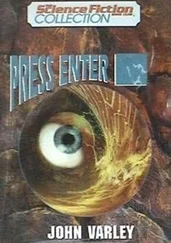John Varley - Millennium
Здесь есть возможность читать онлайн «John Varley - Millennium» весь текст электронной книги совершенно бесплатно (целиком полную версию без сокращений). В некоторых случаях можно слушать аудио, скачать через торрент в формате fb2 и присутствует краткое содержание. Жанр: Фантастика и фэнтези, на английском языке. Описание произведения, (предисловие) а так же отзывы посетителей доступны на портале библиотеки ЛибКат.
- Название:Millennium
- Автор:
- Жанр:
- Год:неизвестен
- ISBN:нет данных
- Рейтинг книги:3 / 5. Голосов: 1
-
Избранное:Добавить в избранное
- Отзывы:
-
Ваша оценка:
- 60
- 1
- 2
- 3
- 4
- 5
Millennium: краткое содержание, описание и аннотация
Предлагаем к чтению аннотацию, описание, краткое содержание или предисловие (зависит от того, что написал сам автор книги «Millennium»). Если вы не нашли необходимую информацию о книге — напишите в комментариях, мы постараемся отыскать её.
Millennium — читать онлайн бесплатно полную книгу (весь текст) целиком
Ниже представлен текст книги, разбитый по страницам. Система сохранения места последней прочитанной страницы, позволяет с удобством читать онлайн бесплатно книгу «Millennium», без необходимости каждый раз заново искать на чём Вы остановились. Поставьте закладку, и сможете в любой момент перейти на страницу, на которой закончили чтение.
Интервал:
Закладка:
"What, are you asking for a guess?"
"Why not?"
"Hell, I don't know if we can hang anybody at all. It's early, you understand. There may be something we can turn up that'll -- "
"Off the record, Tom."
He nodded. "Right. We still might not find anybody to blame."
"Listen, Tom. If a tornado springs out of a clear blue sky and wrecks a plane, I'll concede it wasn't anybody's fault. If a meteor falls on a plane, we probably couldn't have done anything about it. If -- "
"Spare me the speech," he said. "I've heard it. What if it turns out that the people to blame are us? You and me and the Board."
"It's been me. It'll be me again." I didn't go on, because he knew what I was talking about.
Sometimes we can't find out exactly what went wrong and you never know if it's just because you didn't look hard enough. Then again, sometimes you find the cause, put it in the report, tell the folks who are supposed to fix it, and they don't fix it. You keep after them to do something about it, but you'll never know if you pushed them hard enough. Did you really go to the wall over it, and was it worth risking your job for ... and so forth. So far there'd never been a dear-cut case where a plane had crashed because I'd overlooked something, let something go that I should have done. But there were any number of crashes that left me wondering if I'd pushed just a little bit harder ...
"Eli said he's seen this before," Tom said.
"Did he report it?" I mean, Eli was a friend, but there are limits.
"He says he did. He's only seen it once, but he's heard of two or three more times it's happened. It's just been such a small problem that nobody's gotten around to doing anything.
You know, the problem of the old computers in general outweighs this glitch in particular.
There's a file on it back in Washington."
"You've seen it?"
"Yeah. I've even fiddled with a solution, but I don't know if it'd work. Short of getting new hardware."
"What does that mean?"
"It's a one-in-a-million thing. It can happen when two planes are in the same section of the sky and the same distance from the radar dish. The ground station queries the on-board transponders, and they respond, and the signals get to the ground at the same time. It's got to be real close; thousandths of a second. And then, sometimes, the computer can't handle it.
They mistake the signals and put the wrong numbers up on the screen. It's garbage in, garbage out."
I knew what he was talking about, but I wasn't sure he was right. Computers, contrary to what you may have been told, are not smart. They're just fast. They can be programmed to act smart, but then it's the programmer who's actually smart and not the computer. If you give a computer long enough to chew on a problem it will usually solve it. And since a long time to a computer is about a millionth of a second, they give the illusion of being smart.
"Okay," I said. "So the information the computer got was garbage, or at least misleading.
An ATC computer shouldn't accept information that's obvious garbage."
"But how obvious was it? And don't forget it was just shut down. Maybe it didn't have anything to work from. Maybe it was starting from scratch, and it seemed perfectly reasonable that two planes had changed positions."
"It should have been obvious."
"Well," he said, with a sigh, "it would have been obvious to the new computers, which wouldn't have gone down in the first place."
I looked at him for a while, and for a while he kept chewing on his hot dog, which seemed tougher than any hot dog had a right to be.
"You're saying the new computers could have handled this?"
"Damn right they could have. They do it every day. The ones we've got in place. Hell, there were computers around seven or eight years ago that wouldn't have got into the bind this one did."
"We should have pushed harder."
"How much harder can you push?"
He was talking about a meeting six months before. Because of a computer overload in the Boston area there had been a situation that had been brought to our attention. In this case the planes didn't hit, they just sort of played chicken with each other until one pilot pulled up in time. So once again we brought up the subject of computer replacement.
Most of the FAA computers were bought and installed in 1968. Somebody had what must have seemed like a good idea at the time, which was to buy the hardware instead of lease it.
So the U.S. Government soon owned many millions of dollars worth of computers, which they operated and maintained themselves.
Years went by.
If you know anything about the computer field, you know that a computer built ten years ago might as well come from the stone age. It doesn't matter that the thing has been well maintained, that it works wonderfully at what it was designed to do: it's worth nothing at all.
If you can sell it for scrap metal you're lucky, because who wants to buy a big mainframe computer that can't do half the stuff that can be done better nowadays by a machine a hundredth the size? The FAA computers were now white elephants. They worked -- though they were approaching the limits of their design load and as a result suffering a lot of downtime. We were in the process of replacing them, but it's expensive and budgets are tight It would take a while.
And what the hell? In that business, about the time you take the dust-covers off and plug them in, somebody's got something twice as good on the market at half the price. We find ourselves always looking down the road at what'll be available next year and wondering if it might not make more sense to wait just a little longer.
I'd been opposed to the slow schedule. I wanted to get them all replaced within a year, and the hell with next year's models. But it wasn't something worth losing my job over.
If you look hard enough, you'll find the person responsible.
When we got back they were ready to play the copy of the tape from the 747 CVR.
We all gathered around again -- more people this time; I don't know how it happens but an investigation accumulates people like a dog picks up fleas -- and the tape was started.
There was a bad hiss that came and went, but we were able to hear most of it.
There were four people in this cockpit. They were having a good time, chattering back and forth, telling jokes.
Gil Crain, the pilot, was the easiest voice for me to place. I'd known him, and besides, he had a strong Southern accent. A legitimate accent, by the way. Half the commercial airline pilots in the sky affect a West Virginia drawl over the radio, pretending they're Chuck Yeager, who staffed the whole thing back in the "50s. The rest of them use a bored sing-song patois I've started to call Viet-Nam jet jockey. Sometimes you'd think you were listening to a lot of interstate truckers on the CB's. But Gil Crain was born and raised on Dixie soil. He'd soon be buried in it He spent a lot of his time talking about his kids. That wasn't easy to listen to, considering what was about to happen to him. I recall the cockpit tape from the San Diego crash. They were discussing life insurance, little knowing how badly they'd need it in a few minutes.
The guy with the giggle was Lloyd Whitmore, the engineer. John Sianis, the co-pilot, had a faint foreign accent -- something middle-eastern, I thought -- and a crisp, precise way of talking.
The last guy up there was Wayne DeLisle. He was listed as an observer, but it would be more accurate to call him a deadhead. He was a Pan Am pilot hitching a ride in the cockpit jumpseat. He'd been due to take a flight out of San Francisco the next day, bound for Hong Kong. He hadn't been too close to the mike and his voice wasn't very distinctive, but he talked so much I soon had no trouble picking him out from the rest.
Читать дальшеИнтервал:
Закладка:
Похожие книги на «Millennium»
Представляем Вашему вниманию похожие книги на «Millennium» списком для выбора. Мы отобрали схожую по названию и смыслу литературу в надежде предоставить читателям больше вариантов отыскать новые, интересные, ещё непрочитанные произведения.
Обсуждение, отзывы о книге «Millennium» и просто собственные мнения читателей. Оставьте ваши комментарии, напишите, что Вы думаете о произведении, его смысле или главных героях. Укажите что конкретно понравилось, а что нет, и почему Вы так считаете.






